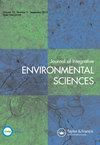Land-use change and Biogeochemical controls of soil CO2, N2O and CH4 fluxes in Cameroonian forest landscapes
IF 3.5
4区 环境科学与生态学
Q3 ENVIRONMENTAL SCIENCES
Journal of Integrative Environmental Sciences
Pub Date : 2020-07-20
DOI:10.1080/1943815X.2020.1779092
引用次数: 8
Abstract
ABSTRACT Deforestation and land-use change are accelerating in the Congo Basin and elsewhere in the tropics affecting the soil-atmosphere exchange of greenhouse gases (GHG). There is a lack of data from Central Africa. We quantified fluxes of CO2, CH4, and N2O at the soil-atmosphere interface in a secondary forest, a cocoa agroforest, and an unfertilized cropland. Soil respiration was highest in the secondary forest (15.37 ± 3.42 Mg C ha−1 y−1), intermediate in the cacao agroforest (12.26 ± 2.91 Mg C ha−1 y−1) and the lowest in the unfertilized cropland (8.74 ± 2.62 Mg C ha−1 y−1). Likewise, N2O fluxes were highest in the secondary forest (2.17 ± 0.20 kg N ha−1 y−1), intermediate in the cacao agroforest (1.40 ± 0.08 kg N ha−1 y−1) and lowest in the unfertilized cropland (1.04 ± 0.15 kg N ha−1 y−1). Soils were a sink for atmospheric CH4 and sink strength was high in the secondary forest (−3.60 ± 1.83 kg CH4 ha−1 y−1) and cacao agroforest (−3.61 ± 2.09 kg CH4 ha−1 y−1) and low in the unfertilized cropland (−1.9 ± 1.59 kg CH4 ha−1 y−1). Variation in soil water content rather than temperature was the dominant driver of seasonal variations of the fluxes at all study sites and N availability affected both N2O and CH4 fluxes. Our results suggest that tropical land-use change is decreasing soil respiration, decreasing the strength of the soil CH4 sink and decreasing N2O emissions, in landscapes that do not practice agriculture with chemical fertilization.喀麦隆森林景观中土地利用变化和土壤CO2、N2O和CH4通量的生物地球化学控制
在刚果盆地和其他热带地区,森林砍伐和土地利用变化正在加速,影响着温室气体(GHG)的土壤-大气交换。缺乏来自中非的数据。我们量化通量的二氧化碳、甲烷和一氧化二氮在土壤空气界面次生林,可可agroforest,土地不肥沃的农田。次生林土壤呼吸最高(15.37±3.42 Mg C ha−1 y−1),可可混交林中等(12.26±2.91 Mg C ha−1 y−1),未施肥农田最低(8.74±2.62 Mg C ha−1 y−1)。同样,N2O通量在次生林中最高(2.17±0.20 kg N ha−1 y−1),在可可混交林中居中(1.40±0.08 kg N ha−1 y−1),在未施肥的农田中最低(1.04±0.15 kg N ha−1 y−1)。土壤是大气CH4的汇,其汇强度在次生林(- 3.60±1.83 kg CH4 ha−1 y−1)和可可混交林(- 3.61±2.09 kg CH4 ha−1 y−1)中较高,在未施肥的农田中较低(- 1.9±1.59 kg CH4 ha−1 y−1)。土壤含水量的变化是影响N2O和CH4通量季节变化的主要因素,而不是温度的变化,氮有效性影响N2O和CH4通量。研究结果表明,在不施用化学肥料的热带土地利用变化会降低土壤呼吸、降低土壤CH4汇强度和减少N2O排放。
本文章由计算机程序翻译,如有差异,请以英文原文为准。
求助全文
约1分钟内获得全文
求助全文
来源期刊

Journal of Integrative Environmental Sciences
ENVIRONMENTAL SCIENCES-
CiteScore
3.90
自引率
0.00%
发文量
13
审稿时长
>12 weeks
期刊介绍:
Journal of Integrative Environmental Sciences (JIES) provides a stimulating, informative and critical forum for intellectual debate on significant environmental issues. It brings together perspectives from a wide range of disciplines and methodologies in both the social and natural sciences in an effort to develop integrative knowledge about the processes responsible for environmental change. The Journal is especially concerned with the relationships between science, society and policy and one of its key aims is to advance understanding of the theory and practice of sustainable development.
 求助内容:
求助内容: 应助结果提醒方式:
应助结果提醒方式:


